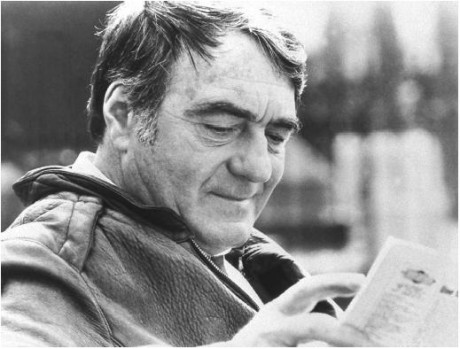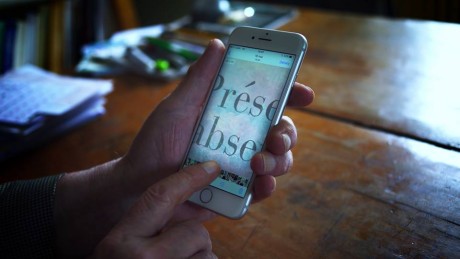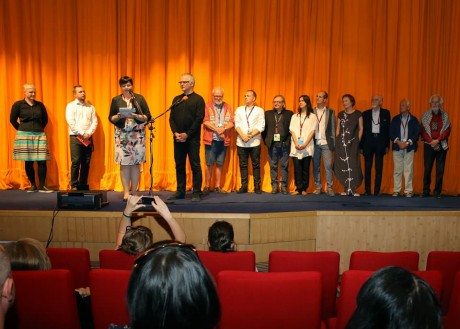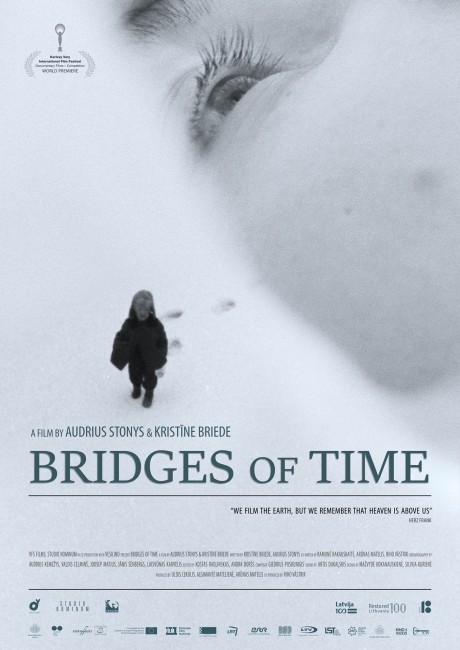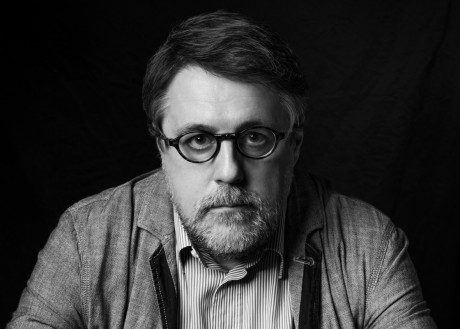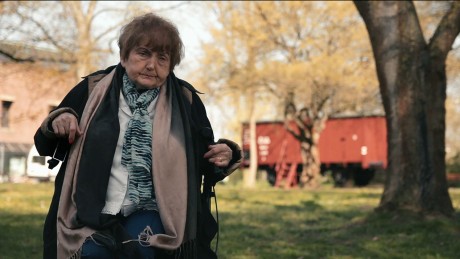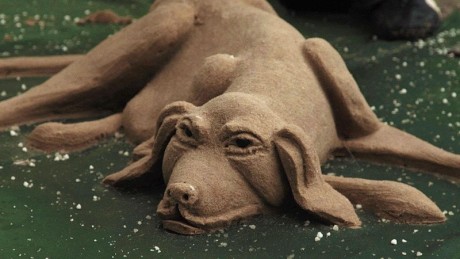Even if I lived a hundred lives, I still wouldn’t be exhausted…
MURMELSTEIN
The Guardian published a very interesting article Tuesday, May 14th 2013, Agnès Poirier had seen the new film by legendary Claude Lanzmann about Benjamin Murmelstein, who collaborated with the Nazis as the last Jewish Council President in Theresienstadt. Poirier talks to Lanzmann about Murmelstein and the film that will be shown in Cannes tomorrow (May, 18 2013). I have taken some quotes from the long article:
… There are two men on a balcony looking out at the panorama of Rome. It is the summer of 1975. “Are you happy in Rome?” says one. “As happy as an exiled Jew can be,” says the other. The man asking the question is Claude Lanzmann. He has just started work on what will take him 10 years to finish: Shoah, the ground-breaking, nine-and-a-half-hour film about the Holocaust, composed of first-hand testimony and eschewing historical footage…
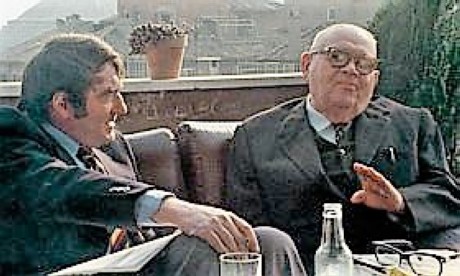
Still: Lanzmann and Murmelstein, Rome 1975, “The Last of the Unjust” (2013)
Lanzmann never included Murmelstein in ”Shoah”, now he gets ”his own film”… Murmelstein, who called himself “the last of the unjust”, perfectly represented (those) contradictions…
His testimony raises a trail of questions, all painfully complex. Indeed, his extraordinary presence, blunt sincerity, acerbic wit and erudition would shake anyone who has inherited history’s prejudices against those Jews who worked with the Nazis. Lanzmann has endeavoured to rehabilitate them. In the preamble to his new film “The Last of the Unjust”, which will screen at the Cannes film festival on Saturday, May 18th, he writes that Murmelstein’s revelations never ceased to haunt him, and that the time had come to share them. “Murmelstein was brilliantly intelligent and extraordinarily courageous,” Lanzmann says. “During the week I spent with him, I grew to love him. He does not lie: he is as harsh with others as with himself”… (Blogpost 17-05-2013 by Tue Steen Müller)
THE LAST OF THE UNJUST
The film of Lanzmann is extraordinary in all aspects: The story about how the film was made and why it did not come out before now has been dealt with in numerous interviews with the author, journalist and film director – you should read them as well as his praised ”The Patagonian Hare”, his written memoirs, from where this statement comes: “Even if I lived a hundred lives, I still wouldn’t be exhausted.” Indeed, this film is a strong evidence of the energy and power of a man, who was born in 1925.
The main character is extraordinary: Benjamin Murmelstein, Jewish Elder in Theresienstadt, interviewed by Lanzmann in Rome in 1975, a controversial person, strongly accused for his collaboration with the Nazis. ”The last of the unjust”, as he called himself, is rehabilitated by Lanzmann, and others, for his saving of 120.000 Jews from Vienna before the war (a number mentioned by Lanzmann in an interview in Le Monde 13/11/13) as well as his keeping Theresienstadt running as the working place it was supposed to be, planned by Eichmann as the ”model camp”, a gift to der Führer. As you see in the propaganda film, that Lanzmann shows clips from, the only archive from the camp, otherwise he uses drawings made by survivors.
Murmelstein is fascinating to watch and listen to in the interview, that Lanzmann did not manage to include in ”Shoah”, that came out 10 years later. But now it is there and stands on its own as a unique film contribution to an eventual rewriting of history. It calls back and questions the view upon Eichmann put forward by Hannah Arendt, who followed the process against him in Jerusalem, and characterised Eichmann as a man who worked according to what a system asked him to do. In the film, however, Eichmann, by Murmelstein, is characterised as ”a demon”, who was very much involved in the ”Crystal Night” in November 1938, and from the very beginning, before any talk about ”Endlösung”, planned and followed the mission to get all Jews out of ”Der dritte Reich”.
But is he the main character? No, Claude Lanzmann is, the chainsmoking interviewer you see in 1975 on a balcony in Rome with Murmelstein, filmed extraordinarily by the late French cameraman William Lubtchansky in 1975, and by Caroline Champetier, who went with Lanzmann to search for cinematic solutions for the narrative, he wants to convey.
And they are wonderfully out of mainstream: Lanzmann has chosen to start the film by taking the viewer to the train station Bohusvice, where he with manuscript in hand introduces the ghetto nearby, Theresienstadt, where he later in the film consequently also performs reading with papers in hand. You could argue that this is totally unfilmic, if there is such a thing (!), but it works here because of the charisma of Lanzmann, his commitment, his powerful husky voice that gives the viewer the information about what happened in the camp.
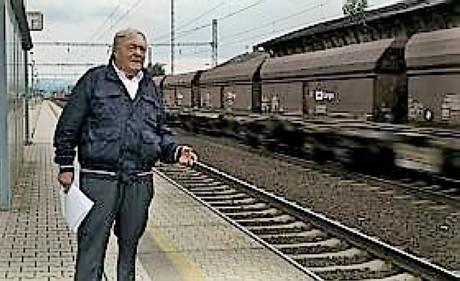
Still: Lanzmann, train station Bohusvice, “The Last of the Unjust” (2013)
Champetier makes stunning images from Theresienstadt, moving through the empty streets, she has filmed streets of Vienna, where Murmelstein was working as a rabbi and for Eichmann, she films in Jerusalem and in Prague, where some of the most moving and beautiful sequences are to be found:
Lanzmann is walking in the Golem synagogue, the camera is not close to him (filming prohibited), it is almost candid when you see and hear him reflecting/commenting for himself, when he recognises names on the wall from Theresienstadt. There is a change in his mood, a sadness that goes with him to the next scene in the camp, where he is at a ”lieu mort” that he describes also to be a ”lieu de mort”, a ”sinister place with an unforgettable beauty” – abandoned and devastated it looks – and in comes the song of a Rabbi, introduced earlier on in the film. Lanzmann is a master of written and verbal language and it is fascinating to see how a man in his late 80’es walks to and fro talking to the audience, stopping to sit at the gallows in Theresienstadt, giving both facts about when and how it happened at the same time as you can see how he totally understands and lives what happened.
Back to 1975, to the interview in Rome, to a 40 year younger Lanzmann, who talks to Murmelstein, 70 years old. Lanzmann’s German is far from perfect and you can see, and hear, that he misses a lot of what says Murmelstein, who talks quickly and often in methaphors. It is actually sometimes funny to see how Lanzmann insists on getting the time correct from Murmelstein (”when was this, when was that”) and it takes a long time (around two hours into the film) before Lanzmann directs the obvious question to Murmelstein about how he felt being at a place, where death was present every day. That scene is a two-shot with both of them in the picture – you are invited to read the faces. Lanzmann and Lubtchansky knew apparently precisely what they wanted to get from Murmelstein in that scene.
I saw the film in Paris (in a, projection-wise, good UGC-cinema in the ugly surroundings of les Halles). The version was vo = Lanzmann speaks in French, he and Murmelstein German with French subtitles. My French is far from perfect so I did not get it all… 220 minutes, no break, not needed for this extraordinary film. To be seen again and again. (Blogpost 16-11-2013 by Tue Steen Müller)
SHOAH
November 27th 2015 Claude Lanzmann could celebrate his 90 year birthday. It gave me the inspiration to celebrate him by visiting youtube, where you can find a lot of clips from from Shoah and other of his films plus a long, very fine filmed masterclass with him from IDFA 2013, where his ”The Last of the Unjust” (220 mins.) was shown. In his written memoirs, “The Patagonian Hare”, comes this statement: “Even if I lived a hundred lives, I still wouldn’t be exhausted.” Indeed, and he repeats this in the conversation parts of the new film with him, ”Claude Lanzmann: Spectres of the Shoah”, directed by Adam Benzine, 40 mins. with BBC, ZDF/arte, DR and HBO as ”involved tv channels” as it is put on the IDFA Docs for Sale, the excellent service from the festival.
Lanzmann says that he still is full of ”vitalité”. As usual it is fascinating to watch and listen to him, while the film apart from those sequences does not really add anything (except for some unknown footage from his interview with a high rank Nazi and the trouble it gave Lanzmann). Anyway, for those who have NOT yet seen ”Shoah”, watching ”Spectres of the Shoah” afterwards makes sense. Here is the description from the IDFA website:
In 1973, Claude Lanzmann started shooting Shoah, a nearly 10-hour film that many regard as the most important ever made about the Holocaust. The Frenchman worked for a full 12 years on the documentary, which was commissioned by the Israeli Ministry of Foreign Affairs. But making Shoah left its mark on Lanzmann. He filmed 200 hours of material in 14 countries, before spending five years editing it. And then there was the infamous confrontation with a former Nazi and his henchmen. The director described his documentary as “a film about death, not about surviving.”
DE BEAUVOIR AND SARTRE
He explains in “Spectres of the Shoah” how it wore him out and almost deprived him of his will to live. Lanzmann experienced the completion of “Shoah” as a death, and it took a long time for him to recover from it. The now almost 90-year-old filmmaker discusses his warm friendship with Simone de Beauvoir and Jean-Paul Sartre, and his teenage years in the French resistance during the Second World War. The film also features unseen material from his magnum opus. (Blogpost 29-11-2015 by Tue Steen Müller)
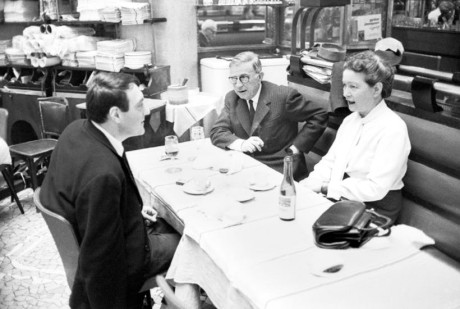
Photo: Lanzmann, Sartre and Simone de Beauvoir 1964
http://www.guardian.co.uk/film/2013/may/14/claude-lanzmann-last-unjust



